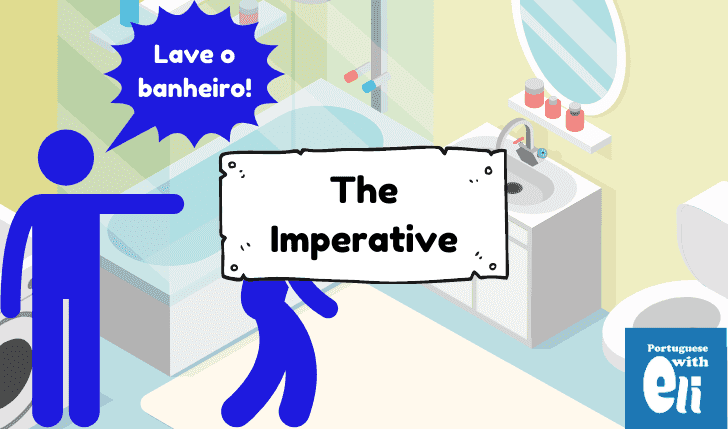Learning the Imperative? Portuguese Does Have It Easy

If you are learning the imperative, Portuguese doesn’t have it very easy.
I mean, if you’re learning Brazilian Portuguese you have a hard time.
If you’re learning European Portuguese, things are more regular.
And because I am Brazilian, what I present here is the Brazilian version…
Or the confusion.
Well, that’s a lot of mystery for a single grammar point, right?
Yes, it is.
But as you’ll see, there is a very good reason for that.
Imperative, or Command Form.
The command form is actually a verbal mood.
And ain’t we lucky? This mood has only one tense :-).
If you want to give a command, you’ll have to worry about the present tense.
If you’re telling your friend to wait for you… Or asking somebody to lower their voice… Or even when you want someone to recheck them when you just gave them…
It’s the imperative that we use in Portuguese.
Affirmative Imperative — Clear Commands
As the name implies, it’s a command you give by means of an affirmation or statement.
- Pare com isso! Stop it.
- Resolva este problema. Solve this problem.
- Escreva o relatório hoje. Write the report today.
- Faça seu dever de casa. Do your homework.
And the conjugation for every regular verb follows the table below.
| Pronome | Comprar (AR) | Comer (ER) | Sair (IR) |
| (Tu) | Compra | Come | Sai |
| (Você) | Compre | Coma | Saia |
| (Nós) | Compremos | Comamos | Saiamos |
| (Eles) | Comprem | Comam | Saiam |
Four important points here:
The root for the imperative comes from the first person conjugation for the present tense. (Eu compro, compr-, and eu como, com-)
The conjugation for “nós” corresponds to “let’s + verb” in English.
In Brazil, we don’t really differentiate between the formal you — you — and the formal you — you.
Well, some people do as you can see in this article.
But this lack of differentiation influences how we use the command form.
We use the imperative in Portuguese for tu and você regardless of the right pronoun in any given situation.
And your friend Carla will both write and speak that way.
- Faz o que achar necessário (correct: faça). Do whatever you think necessary.
- Sai daqui! Você é chato para caramba! (correct: saia) Get outta here! You’re so annoying!
Negative Imperative, or Don’t Do It!
Are your kids acting up and you want them to stop?
Is your Brazilian friend making a lot of noise… And you want him to stop?
Is your husband or wife saying something… And you don’t agree with that and you want them to stop?
The negative imperative is what you’re going to use.
- Não faça barulho. Don’t make noise.
- Não diga isso! Don’t say it!
And take a close look at the table below.
If you are one of those people who need to use the right conjugation for “tu” (perhaps you are in Portugal), bear in mind that there are conjugation changes.
But if you’re here in Brazil, don’t worry.
| não | Comprar (AR) | Comer (ER) | Sair (IR) | Pronome |
| não | Compres | Comas | Saias | (Tu) |
| não | Compre | Coma | Saia | (Você) |
| não | Compremos | Comamos | Saiamos | (Nós) |
| não | Comprem | Comam | Saiam | (Eles) |
Important note about the usage of the imperative in Portuguese.
Even though I present the conjugations for all pronouns, we use mostly the forms for you — both singular and plural.
And the (parenthesis) indicates that we don’t really include that word in speech.
Although Maria and José don’t really care for the right conjugation when chatting, they should — and usually, they do — pay attention to the right forms in writing.
And here are some more examples with very high-frequency sentences for your benefit.
Giving an Order
- Cale essa sua boca grande. Shut your big mouth up.
- Abram a porta, porque o carro está chegando. Open the door because the car is coming.
Giving Advice
- Pare de fumar. Você está grávida e fumar faz mal para o bebê. Stop smoking. You’re pregnant and smoking harms the baby.
- Se esforce um pouco mais. Eu sei que você consegue. Make a bit more effort. I know you can do it.
Giving Suggestions
- Eu sei, comer peixe é difícil. Comece pelo meio. A carne está toda lá. I know, eaten fish is hard. Start from the middle. The meat is all there.
- Fale com seus pais antes de tomar uma decisão. Eles têm bastante experiência e vão saber como te ajudar. Talk with your parents before making a decision. They you have a lot of experience and will know how to help you.
Giving Directions
- Se quiser chegar lá mais rápido, vá pela Avenida Brasil e pegue a terceira à esquerda. If you want to get there faster, go by the Brazil Avenue and turn the third left.
- Dê a volta naquela árvore e siga em frente. Não tem erro. Turnaround on that tree and go ahead. There is no mistake there.
And How about Irregular Verbs, Eli? You Didn’t Talk about Them.
No, I didn’t.
And that was on purpose.
There is no easy formula for irregular verbs.
You have to commit them to memory.
And a good practice is memorizing both the infinitive and its command form.
I’m not saying that this is the case, but most of the time the imperative form of irregular verbs coincides with that of the present subjunctive.
But I’m not saying this is true all the time.
You should do your due diligence and investigate 🙂
And the example for Saber comes from this song.
- (ser) Seja bem-vindo. Be welcome!
- (saber) Saiba que o meu grande amor hoje vai se casar. You can take it from me that my greatest love is going to marry today.
- (estar) Esteja aqui às cinco horas em ponto. Be here at 5 o’clock sharp.
- (ir) Vá de táxi, já que você está assim tão empolgado para encontrá-la. Take the taxi since you are so excited to meet her.
- (dar) Me dê uma esmolinha, pelo amor de Deus. Give me something (alms), for God’s sake.
And Using the Infinitive as a “Command” in Portuguese
A commenter brought it to my attention (thanks, Matthew!) and yes, we can also use the infinitive as a command (aka the Imperative).
It used to be more common. When I was a kid, I could see signs like these everywhere:
please do not sit please do not throw paper on the toilet
As I said before, they used to be more common, but nowadays I see them less and less.
However, for recipes, it’s quite common to see the Infinitive being used as the Imperative in Portuguese.
From TudoGostoso.com (popular but so full of ads! It’s hard to navigate):

But you can see in 3 it’s using now the regular form of the Imperative.
Two common places to find the infinitive being used as Imperative are signs (though, as I said, not so often) and Instruction Manuals and things like it (recipes fall into this category). But —
In my opinion, using the Infinitive like this is going to happen less and less as Brazilians distance themselves from the written language. In spoken Portuguese, we don’t speak like that — at least, I have never heard it, unlike in Italian, which still has it (though with some constraints, as seen here).
And Now, What Should I Do?
If you’ve read up to this point, you probably want to use the verbs in Portuguese with confidence.
It’s your lucky day.
I’m offering to you at no cost a free report on the main Portuguese verb tenses and their conjugation…
But you know, that’s not the most important.
The most important is always — how to use them.
And that’s what you will learn in this report.





hi Eli! I had a quick question about using the infinitive as a “command”. I’ve noticed that in some recipes written in Portuguese, or directions on an exam, it’ll use the infinitive (instead of a command) instead of the imperative. Is this pretty standard? For example “Preencher os espaços com a forma e o tempo apropriado” (exam directions) or “Deixar cozinhar até tudo ficar macio” (directions on a recipe) .. instead of “Preencha” and “Deixe”.
Hi, Matthew! It’s kind of common in recipes and other documents that give instructions on how to do something. But it’s being used less and less. When I was a kid (in two years, it’ll be “too long ago” for some) I used to see it in signs, too, especially in hospitals (“por favor, fazer silêncio”; “favor não fumar”). But nowadays I don’t see that much, not even in hospitals. The “regular” Imperative is much more common. But if you’re into recipes, you’ll see it a lot. And, if you like recipes in Portuguese, look for Dona Benta and Ana Maria. Two great sources, recipes are simple, and food gets delicious — with instructions in the infinitive and imperative to boot 🙂
(Quick thing: I updated the article to reflect this answer. Thanks for asking the question!)
Hi Eli,
What about imperative of reflexive verbs? So far, it is all similar to Spanish. However, in Spanish, the reflexive goes at the end of the imperative unless it is a negative. (sientate vs no te sientas). The same rule applies with Direct objects (comalo vs no lo comas).
How does Portugese treat reflexive verbs and direct objects when dealing with an imperative?
Thanks
Great question! In Portuguese, reflexive and direct object pronouns follow a rule similar to Spanish:
Affirmative imperative → The pronoun attaches to the verb with a hyphen: Sente-se!, Vista-se!, Coma-o!
Negative imperative → The pronoun comes before the verb: Não se sente!, Não o coma!
So, just like in Spanish (siéntate vs. no te sientes), but with the hyphen in affirmative forms. And that’s for written Portuguese. In spoken Portuguese: “Se sente!” “Se vista!” Hope that helps! 😊